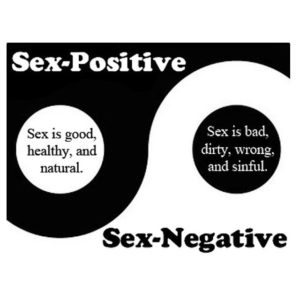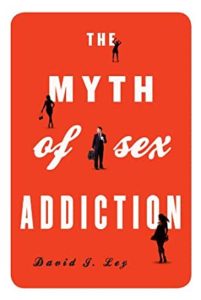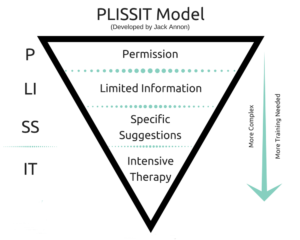 The title of this page might seem a bit redundant. Why, you might ask, is it necessary to specify that “sex therapy” is “sex positive?” I find that many therapists who claim to be “sex positive” are not. Many have little to no training or education in the full range of human sexual behavior. In fact, the only training many therapists and physicians have in human sexuality is in the diagnosis of sex problems or “paraphilias.” In other words, they have no idea how to define “normal;” especially in terms of sexual behavior. They may think they are “sex positive,” but many of my clients have reported that other therapists have made them very uncomfortable by judging them, implying or directly stating that they are not “normal,” by assuming pathology, or trying to change them in ways they did not desire. I will do none of those things!
The title of this page might seem a bit redundant. Why, you might ask, is it necessary to specify that “sex therapy” is “sex positive?” I find that many therapists who claim to be “sex positive” are not. Many have little to no training or education in the full range of human sexual behavior. In fact, the only training many therapists and physicians have in human sexuality is in the diagnosis of sex problems or “paraphilias.” In other words, they have no idea how to define “normal;” especially in terms of sexual behavior. They may think they are “sex positive,” but many of my clients have reported that other therapists have made them very uncomfortable by judging them, implying or directly stating that they are not “normal,” by assuming pathology, or trying to change them in ways they did not desire. I will do none of those things!
I am a Licensed Clinical Professional Counselor, with far more training in human sexuality and sex therapy than most therapists (including many who list “sex therapy” among their areas of expertise). I do not, however, define myself as a “Sex Therapist.” Instead, I think of myself as a therapist who works with children, adolescents, adults, and families (in any form or constellation) around many issues, including sex and sexuality, from an holistic point of view. As a sex positive counselor, I see sex and sexuality as parts of what make us human, rather than as problems to be solved.
 I believe strongly in the beneficial influence sex and sexuality can have on people’s lives and in the world in general, but I am not naive about the ill effects that can come as a result of problematic sexual behaviors. I prefer to address those issues from a rigorous scientific, rather than ideological or moralistic perspective. I will not judge you!
I believe strongly in the beneficial influence sex and sexuality can have on people’s lives and in the world in general, but I am not naive about the ill effects that can come as a result of problematic sexual behaviors. I prefer to address those issues from a rigorous scientific, rather than ideological or moralistic perspective. I will not judge you!
I wish more people sought help finding ways to make their sex lives more positive, but most come to me with concerns about their sexuality or that of their children or other family members. These include questions about intimate relationships, sexual “dysfunctions,” sexual interests or orientation, impulsive or compulsive sexual behavior, difficulties with sexual arousal, painful intercourse (which should never just be accepted as “normal”), aging, intimacy issues related to disability or chronic medical conditions, sexual trauma, etc.
 I feel that sex is an important part of most, but not all, intimate relationships, but agree with sex therapist Marty Klein, author of Sexual Intelligence (2019), that sex represents only about 11% of what is important in an intimate relationship. Other issues include money, distribution of labor (who does what in the relationship, from chores to the initiation of sex), children (whether to have them, how to raise them, how many to have, etc.), beliefs (religious, political, family, relationships, etc.), health (both physical and mental) and other external factors (influence of extended family, friends, work, etc.).
I feel that sex is an important part of most, but not all, intimate relationships, but agree with sex therapist Marty Klein, author of Sexual Intelligence (2019), that sex represents only about 11% of what is important in an intimate relationship. Other issues include money, distribution of labor (who does what in the relationship, from chores to the initiation of sex), children (whether to have them, how to raise them, how many to have, etc.), beliefs (religious, political, family, relationships, etc.), health (both physical and mental) and other external factors (influence of extended family, friends, work, etc.).
 Sex and Pornography Addiction
Sex and Pornography Addiction
One issue that has become increasingly important over recent years is the influence of pornography on individuals and relationships. I have extensive training and experience working with people around problematic sexual behaviors. I do not agree with Psychologist David Ley, author of The Myth of Sex Addiction, that sex and pornography addictions are “myths,” but I do believe them to be quite rare. The word “addiction” assumes a cause; I prefer to assess the problem before I assign a diagnostic label!
I do not believe it is possible to competently work with people in intimate relationships if a therapist is unable or unwilling to address any of these issues, including sex and sexuality. I believe all therapists should have extensive training in human sexuality. Unfortunately, according to Dr. David Ley, most therapists have little to no training in human sexuality. This is even true of medical doctors, according to Dr. Justin Lehmiller, author of Tell Me What You Want: The Science of Sexual Desire and How it Can Help You Improve Your Sex Life, who reports that sex education barely exists in medical schools!
Sex therapy can be effective for individuals of any age, gender or sexual orientation, and can be provided to individuals, couples, families or polycules. Sex therapists do not have sexual contact with clients, in the office or anywhere else. Sexual coaching that involves physical contact is not part of mainstream sex therapy. Sex therapy is typically short term in duration, with a limited number of sessions. However, treatment plans depend on the concerns and goals being addressed.
 PLISSIT Model
PLISSIT Model
My approach to sex therapy (all therapy, really) can best be summed up by the “PLISSIT Model” (Annon, 1974).
Permission: The first step is very simple. I make it abundantly clear that I am willing and able to discuss sexual issues without judgement, embarrassment, etc. Parents need to do the same with their children. If you show embarrassment, you will teach your children shame.
Limited Information: Because people generally want to learn something useful, even during our first sessions, I provide some limited information so they can begin to explore their own sexuality, either alone or in a relationship. The reason I say “limited information” is that it might be a bit overwhelming to be flooded with too many ideas and suggestions. Sex and sexuality are very broad topics that take time to explore!
Specific Suggestions: Because we cannot think our way out of a problem, I make specific suggestions for things the person can do to change their behavior. These might include relaxation or communication exercises or more specialized activities designed to address specific sexual issues.
Intensive Therapy: I find that most individuals and couples do not need more intensive therapy to help them address their sexuality issues. I find, instead, that most people are victims of our society’s unwillingness to talk about sex and sexuality.

Sex and sexuality education are important parts of my practice as a counselor and sex therapist. Most of what many people “know” about sex and sexuality is just flat wrong. In fact, 70% of American men report that their primary source of sex education was pornography! Sometimes just providing accurate information is enough to solve what seems an insurmountable problem!
A Note on Certification
There are a few graduate schools in the U.S. that specialize in training for sex therapy. I did not go to one of those schools, but I did take graduate- and undergraduate-level courses in human sexuality (as noted above, many masters programs in Counseling, Social Work and even Marriage and Family Therapy do not include required courses in human sexuality!). I did attend the certificate program in sex therapy at the Institute for Sexuality Education and Enlightenment, but for the most part I have assembled my training by rigorous self-study.
I am a member of the American Association of Sexuality Educators, Counselors and Therapists (AASECT) and of The Society for the Advancement of Sexual Health (SASH). Both organizations and several others offer certifications in Sex Therapy, but I have decided not to spend the additional thousands of dollars to obtain these additional credentials.
I think it is important that you, as a potential client, ask lots of questions and make your own decision about whether I or any other therapist have the knowledge and skills to help you. Assess our attitudes towards you and the issues you bring to therapy. Do you feel comfortable and understood? Or judged? I am never offended by questions. If another therapist is, remember where the door is!